 |
THE WOMEN'S ARCHIVES TURNS TEN
BY SAMMIE MORRIS
|
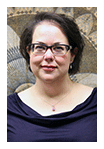
This is a special year for the Susan Bulkeley Butler Women’s Archives, as it marks the 10th anniversary of our founding. With Susan Butler’s support, we started in 2006 to build a program to preserve women’s history at Purdue and in the state of Indiana. When we began, there was very little information available on women, so researchers studying Purdue’s history had very few resources available about the contributions women had made to the institution. As a result, women were at times overlooked in the written histories of Purdue.
The Women’s Archives Development Council was formed in 2010 to help support and advocate for the Women’s Archives, with the ultimate goal of making the program sustainable. This dream became a reality in 2012 when President Córdova gave funds to endow the archivist position to oversee the women’s archives. In 2012, Stephanie Schmitz was named the France A. Córdova Archivist, charged with leading the Women’s Archives into the future.

2010 Women's Archives Development Council. Pictured left to right: Judy Schumaker, Barbara Edmondson, Betty Nelson, Tamara Morse, Priscilla Gerde, Susan Erler, Judith Herd, Susan Butler, Beth McNeil, Stephanie Schmitz
As a result of Stephanie’s work to bring in collections on women, we now have in the archives a better representation of women’s contributions to Purdue. We have the papers of the first woman trustee, Virginia Meredith; the papers of the first state leader of home demonstration agents, Lella Gaddis; the papers of the first woman astronaut alumna, Janice Voss; the papers of one of the Curtiss Wright Cadettes, trained at Purdue in WWII to work as aeronautical engineers. We also have records of important organizations for women like the League of Women Voters and the records of Purdue’s Women’s Studies program. We have collections on the many women who broke barriers as students in the sciences and engineering at a time when they were among only a few women taking classes in those programs. The stories of all these women are part of our shared history at Purdue, and it is important that they are represented in the collection.
Stephanie and I enjoyed looking back through some of the founding documents for the Women’s Archives, which included our long-term vision statement, which stated that we would:
- Gain a national reputation as a research center on women’s history where unique and distinctive collections that tell the stories of women are preserved and used by scholars worldwide.
Some of our long-range goals were to:
- Create grants for out-of-town scholars to travel to Purdue and use collections
- Sponsor an annual award for outstanding contribution to the Women’s Archives
- Integrate use of the collections into the curriculum
- Collaborate with faculty to offer students opportunities to learn primary source research skills using the collections
I’m so pleased as I look at these goals and realize that we have accomplished or are in the process of accomplishing all of these things, as a result of the support of Susan Butler, Tamara Morse, Dean Mullins, the members of the WADC, President Córdova, and everyone who contributed through donating collections or acting as advocates on our behalf.
I have to recognize Stephanie Schmitz for her dedication and hard work in building these incredible collections and going out regularly to talk with faculty and donors and members of the community to promote the Women’s Archives. As we look to the next ten years, we will continue to work hard to increase the teaching and research use of the collections, empowering students and scholars to learn about the women in our past, to honor their struggles and to celebrate their contributions, to Purdue and to the world. It is my dream when Purdue celebrates its 150th anniversary in three years, there will be no excuse to leave the women out of our history. |
 |
WOMEN'S ARCHIVES HONORS TAMARA MORSE
|
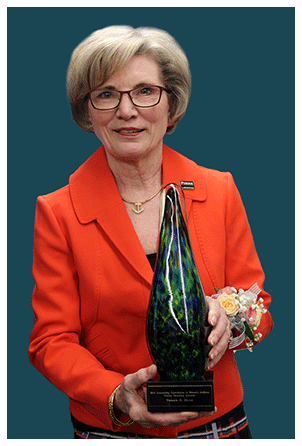 Tamara E. Morse was honored on March 3 with the 2016 Outstanding Contribution to Women’s Archives Award at a reception celebrating the legacy of Purdue women and the preservation of Purdue history. Morse, whose stewardship ensures that the history of women at Purdue is recorded, preserved, documented and accessible for current and future generations was recognized for her commitment to the Women’s Archives. Tamara E. Morse was honored on March 3 with the 2016 Outstanding Contribution to Women’s Archives Award at a reception celebrating the legacy of Purdue women and the preservation of Purdue history. Morse, whose stewardship ensures that the history of women at Purdue is recorded, preserved, documented and accessible for current and future generations was recognized for her commitment to the Women’s Archives.
Although Morse’s first acquaintance with the Purdue Libraries wasn’t until 2006 where she attended the first Women for Purdue Program she and her family have a long-standing relationship with Purdue University beginning with her father, Professor Frederick B. Morse, a mechanical engineering professor for 39 years. She received bachelor’s and master’s degrees in education from Purdue, and earned an MBA from Purdue’s Krannert School of Management.
Morse is a generous supporter of Purdue. In addition to contributing to the Women’s Archives she has endowed a gift to Mechanical Engineering in honor of her father, she is a donor to the Purdue Alumni Association Endowment, was the lead donor for the Delta Gamma Lectureship in Values and Ethics at Purdue, and has made contributions toward the construction of Krannert’s Rawls Hall and the library in the Dick and Sandy Dauch Alumni Center.
She currently is a financial planner, owner, and principal of Morse Financial Group, a financial firm specializing in retirement and estate planning. Prior to establishing her financial advisory practice in 1986, she was the manager of planning and forecasting for the Northwest Marketing Division of Chevron USA in Seattle. Before her corporate experience, she was a classroom instructor for ten years in West Lafayette, Moraga, California and Ahwaz, Iran. |
 |
2016 LIBRARY SCHOLARS GRANT AWARDS
|
The Library Scholars Grant Program was established in 1985 by the 50th anniversary gift of members of the Class of 1935, and the class has been continuously supportive of this fund for the past 31 years. This program supports access to unique collections of information around the country and the world for nontenured and recently tenured Purdue faculty in all disciplines, from the West Lafayette, Calumet, Fort Wayne IUPUI and North Central campuses. The grants cover the expenses associated with the cost of transportation, lodging, meals and fees charged by the library or the collection owner.
Previous year's recipient, Kenneth Kincaid, associate professor of History, North Central, will make a presentation about how the grant helped his research. On April 7 Michael Johnson, associate professor of English, West Lafayette campus will make a presentation in Stewart Center, Room 278 from 2-3 p.m. about how the grant helped his research.
2016 RECIPIENTS
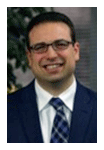 Brett Crawford, assistant professor in the department of Technology Leadership & Innovation, was awarded $4,000 to travel to Montana State University to conduct archival research using The Trout and Salmonid Special Collection. The research aims to explore how environmental associations have contributed to the shifting identity of anglers, moving away from harvesters of trout and salmon populations and towards stewards of coldwater fisheries. Crawford plans to focus on photographs and unpublished manuscripts that detail early thought on river conservation and catch-and-release philosophies. The intended dissemination of the research is twofold. First, organizations and individuals commonly use images to portray human impacts on the natural environment. We know far less about what we would learn about the changing identities of people if we turned the camera around and tracked shifts in identity over time. This archive includes a large number of photographs that will deepen our understanding of early twentieth-century anglers’ identities and relationships with rivers. Second, Crawford has built out a large dataset detailing the emergence and expansion of environmental associations, such as Trout Unlimited, and special regulations intended to manage trout and salmon populations throughout U.S. coldwater fisheries. However, the archive at Montana State University includes a number of unpublished manuscripts written by the “fathers” of catch-and-release fishing that will further develop this research by capturing the origins of river conservation. Brett Crawford, assistant professor in the department of Technology Leadership & Innovation, was awarded $4,000 to travel to Montana State University to conduct archival research using The Trout and Salmonid Special Collection. The research aims to explore how environmental associations have contributed to the shifting identity of anglers, moving away from harvesters of trout and salmon populations and towards stewards of coldwater fisheries. Crawford plans to focus on photographs and unpublished manuscripts that detail early thought on river conservation and catch-and-release philosophies. The intended dissemination of the research is twofold. First, organizations and individuals commonly use images to portray human impacts on the natural environment. We know far less about what we would learn about the changing identities of people if we turned the camera around and tracked shifts in identity over time. This archive includes a large number of photographs that will deepen our understanding of early twentieth-century anglers’ identities and relationships with rivers. Second, Crawford has built out a large dataset detailing the emergence and expansion of environmental associations, such as Trout Unlimited, and special regulations intended to manage trout and salmon populations throughout U.S. coldwater fisheries. However, the archive at Montana State University includes a number of unpublished manuscripts written by the “fathers” of catch-and-release fishing that will further develop this research by capturing the origins of river conservation.
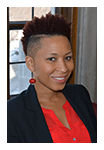 Marlo D. David, an associate professor in the department of English and the Women’s, Gender, and Sexuality Studies Program, was awarded $4,600 to conduct archival research in Los Angeles and New York City using several special research collections to begin work on a book manuscript, tentatively entitled Experimental Aesthetics: Recovering the Art and Life of Bill Gunn. Experimental Aesthetics involves developing a literary and artistic biography of African- American filmmaker, playwright, and actor Bill Gunn (1934-1989), who wrote and/or directed six films, wrote 11 plays, one novel, and performed as an actor throughout the influential U.S. Black Arts Movement (1965-1975). The Black Arts Movement (BAM) marked a major shift in 20th-century African-American literary and artistic production that grew out of the social and political aims of the Black Power Movement. Until recently, most of Gunn’s works had fallen into obscurity, and to date there is no full-length critical manuscript dedicated to his life or his films, plays, and novel. In Experimental Aesthetics, David seeks to recover the lost works of Gunn as well as produce a detailed biography of his life. In particular, she is interested in discovering how the explicit political aims of the BAM may have created tensions for an artist like Gunn, who operated outside of those ordained aesthetics. Gunn’s experimental work, especially his unflinching confrontation with sexuality and black identity, exemplify these tensions and therefore require further inquiry. David will use the Library Scholars Grant to take two, week-long exploratory trips to visit archives and collections in New York City and in Los Angeles in order to locate, read, and make copies of relevant materials related to Gunn’s work as a playwright and filmmaker, as well as to locate papers of his many friends and associates. Marlo D. David, an associate professor in the department of English and the Women’s, Gender, and Sexuality Studies Program, was awarded $4,600 to conduct archival research in Los Angeles and New York City using several special research collections to begin work on a book manuscript, tentatively entitled Experimental Aesthetics: Recovering the Art and Life of Bill Gunn. Experimental Aesthetics involves developing a literary and artistic biography of African- American filmmaker, playwright, and actor Bill Gunn (1934-1989), who wrote and/or directed six films, wrote 11 plays, one novel, and performed as an actor throughout the influential U.S. Black Arts Movement (1965-1975). The Black Arts Movement (BAM) marked a major shift in 20th-century African-American literary and artistic production that grew out of the social and political aims of the Black Power Movement. Until recently, most of Gunn’s works had fallen into obscurity, and to date there is no full-length critical manuscript dedicated to his life or his films, plays, and novel. In Experimental Aesthetics, David seeks to recover the lost works of Gunn as well as produce a detailed biography of his life. In particular, she is interested in discovering how the explicit political aims of the BAM may have created tensions for an artist like Gunn, who operated outside of those ordained aesthetics. Gunn’s experimental work, especially his unflinching confrontation with sexuality and black identity, exemplify these tensions and therefore require further inquiry. David will use the Library Scholars Grant to take two, week-long exploratory trips to visit archives and collections in New York City and in Los Angeles in order to locate, read, and make copies of relevant materials related to Gunn’s work as a playwright and filmmaker, as well as to locate papers of his many friends and associates.
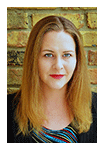 Charlene Elsby, assistant professor of Philosophy at Indiana University-Purdue University, Fort Wayne (IPFW) was awarded $5,000 to travel to the Husserl Archives in Leuven, Belgium, to examine the original manuscripts of Edmund Husserl, and in particular those that provided the foundation for the text On the Phenomenology of Internal Time Consciousness (Phänomenologie des inneren Zeitbewußtseins). Elsby’s research will focus on the concept of time in early phenomenology — how it appears to consciousness, and how it is constituted by consciousness. An examination of the phenomenological concept of time follows naturally from her previous work on the concept of aesthetic genesis in phenomenology, which examines how a robust human consciousness arises from more basic perceptions. From this research, she will produce a monograph proposal, tentatively titled, The Origins of Time in Consciousness and Consciousness in Time. The Library Scholars Grant will allow for 3 weeks to examine the Husserl’s manuscripts and how they were edited by his assistants Edith Stein and Martin Heidegger. (Husserl’s published work on the concept of time has undergone significant modifications from the manuscripts, which are collected under the name of Zeitkonstitution als Formale Konstitution [Time Constitution as Formal Constitution] and housed in the central repository of the Archives in Leuven.) Charlene Elsby, assistant professor of Philosophy at Indiana University-Purdue University, Fort Wayne (IPFW) was awarded $5,000 to travel to the Husserl Archives in Leuven, Belgium, to examine the original manuscripts of Edmund Husserl, and in particular those that provided the foundation for the text On the Phenomenology of Internal Time Consciousness (Phänomenologie des inneren Zeitbewußtseins). Elsby’s research will focus on the concept of time in early phenomenology — how it appears to consciousness, and how it is constituted by consciousness. An examination of the phenomenological concept of time follows naturally from her previous work on the concept of aesthetic genesis in phenomenology, which examines how a robust human consciousness arises from more basic perceptions. From this research, she will produce a monograph proposal, tentatively titled, The Origins of Time in Consciousness and Consciousness in Time. The Library Scholars Grant will allow for 3 weeks to examine the Husserl’s manuscripts and how they were edited by his assistants Edith Stein and Martin Heidegger. (Husserl’s published work on the concept of time has undergone significant modifications from the manuscripts, which are collected under the name of Zeitkonstitution als Formale Konstitution [Time Constitution as Formal Constitution] and housed in the central repository of the Archives in Leuven.)
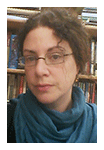 Rebekah Klein-Pejšová, an associate professor in the department of History, was awarded $5000 to conduct archival research in Hungary. Her current book project, with the working title “Across the Iron Curtain: Jewish Displacement, Dispersion, and Contact, 1945-1960,” examines the mutual efforts of Hungarian, Slovak, and Czech Jews remaining inside of postwar Hungary and Czechoslovakia and abroad to remain in contact with each other and the implications of their efforts for Jewish/state relations in the consolidating new global order. This study is organized around points of contact between Jewish survivors within their new postwar global dispersion. The relevant materials related to religion, national minorities and ethnic problems, refugees, and escapees crucial for completing her research for this project are uniquely held in collections of the Open Society Archives (OSA) in Budapest, Hungary. The OSA is one of the world’s largest repositories of Cold War, Radio Free Europe, and Samizdat holdings, especially known for its exclusive collections relating to the postwar political, social, and economic life of the Cold War era Eastern Bloc. The Library Scholars Grant will fund travel to Budapest for four weeks of research in the OSA collections on materials concerning contact between Hungarian, Slovak, and Czech Jews in postwar displacement and dispersion as individuals (family, friends), institutions, communal bodies, and international Jewish organizations across an increasingly fortified border. Klein-Pejšová first received a Library Scholars Grant in 2013, which allowed her to conduct archival research at the YIVO Institute for Jewish Research archives in New York City. Rebekah Klein-Pejšová, an associate professor in the department of History, was awarded $5000 to conduct archival research in Hungary. Her current book project, with the working title “Across the Iron Curtain: Jewish Displacement, Dispersion, and Contact, 1945-1960,” examines the mutual efforts of Hungarian, Slovak, and Czech Jews remaining inside of postwar Hungary and Czechoslovakia and abroad to remain in contact with each other and the implications of their efforts for Jewish/state relations in the consolidating new global order. This study is organized around points of contact between Jewish survivors within their new postwar global dispersion. The relevant materials related to religion, national minorities and ethnic problems, refugees, and escapees crucial for completing her research for this project are uniquely held in collections of the Open Society Archives (OSA) in Budapest, Hungary. The OSA is one of the world’s largest repositories of Cold War, Radio Free Europe, and Samizdat holdings, especially known for its exclusive collections relating to the postwar political, social, and economic life of the Cold War era Eastern Bloc. The Library Scholars Grant will fund travel to Budapest for four weeks of research in the OSA collections on materials concerning contact between Hungarian, Slovak, and Czech Jews in postwar displacement and dispersion as individuals (family, friends), institutions, communal bodies, and international Jewish organizations across an increasingly fortified border. Klein-Pejšová first received a Library Scholars Grant in 2013, which allowed her to conduct archival research at the YIVO Institute for Jewish Research archives in New York City.
 Silvia Z. Mitchell, assistant professor of Early Modern European History, was awarded $ 5,000 to conduct archival research in Spain for an article-length project, titled “Anglo-Spanish Relations during the Regency of Queen Mariana of Austria, 1665-1675.” It focuses on the changing nature of Spain’s diplomatic relations with England under Queen Mariana’s leadership. The Spanish queen’s close collaboration with King Charles II, who returned to power in 1660 after his father’s, Charles I’s execution (1649), and the fall of the Cromwell regime, resulted in commercial and military alliances with pan-European and trans-Atlantic consequences. While marking an unprecedented level of close collaboration, justified by Spanish theologians as necessary for the good of Christendom, very little, if anything, has been published on this important topic. The Library Scholars Grant will help fund travel and six weeks of research in the Archivo Histórico Nacional in Madrid, the Archivo General de Simancas, in Valladolid, and the Archivo Nacional Sección Nobleza, in Toledo. Mitchell will study Mariana’s instructions to and correspondence with her diplomats in London. She will also consult the special series of Spain’s Council of State focused on Anglo-Spanish relations (Estado Inglaterra). In a previous Library Scholars Grant project (2014), Mitchell investigated Queen Mariana’s foreign policy from broad European perspectives. Silvia Z. Mitchell, assistant professor of Early Modern European History, was awarded $ 5,000 to conduct archival research in Spain for an article-length project, titled “Anglo-Spanish Relations during the Regency of Queen Mariana of Austria, 1665-1675.” It focuses on the changing nature of Spain’s diplomatic relations with England under Queen Mariana’s leadership. The Spanish queen’s close collaboration with King Charles II, who returned to power in 1660 after his father’s, Charles I’s execution (1649), and the fall of the Cromwell regime, resulted in commercial and military alliances with pan-European and trans-Atlantic consequences. While marking an unprecedented level of close collaboration, justified by Spanish theologians as necessary for the good of Christendom, very little, if anything, has been published on this important topic. The Library Scholars Grant will help fund travel and six weeks of research in the Archivo Histórico Nacional in Madrid, the Archivo General de Simancas, in Valladolid, and the Archivo Nacional Sección Nobleza, in Toledo. Mitchell will study Mariana’s instructions to and correspondence with her diplomats in London. She will also consult the special series of Spain’s Council of State focused on Anglo-Spanish relations (Estado Inglaterra). In a previous Library Scholars Grant project (2014), Mitchell investigated Queen Mariana’s foreign policy from broad European perspectives.
|
 |
PURDUE e-PUBS AND ROAD SCHOOL ACTIVITIES
BY MARCY WILHELM-SOUTH |
The Purdue Road School landing page in Purdue e-Pubs was on display on a monitor throughout the 2016 Road School; as usual, people loved watching the real-time downloads, which during the event were popping up from as close to home as West Lafayette all the way to Nigeria and China. The monitor also gave us the opportunity to highlight the work that was done near the end of 2015 to digitize and make available the conference materials from Road School going back to 1924 as well as discuss some of the most downloaded items from the series. By the end of the event, we had received materials for more than 80 of the event’s presentations, though we expect more will be submitted electronically in the coming days. People also expressed a lot of interest in the JTRP (Joint Transportation Research Program) reports and the Indiana Mobility Reports series.
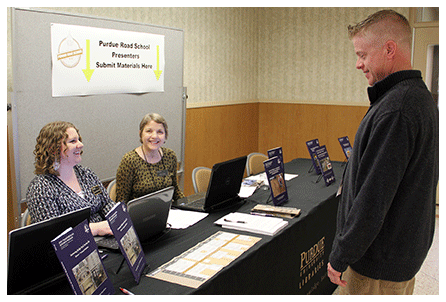
Marcy Wilhelm-South and Kelley Kimm accept presentation materials from speakers at the 2016 Purdue Road School for deposit in the Road School collection in Purdue e-Pubs. Visit the Purdue Online Library for Purdue Road School online content. |
 |
CRITICAL INFORMATION LITERACY SCHOLAR VISITS PURDUE LIBRARIES
BY CLARENCE MAYBEE |
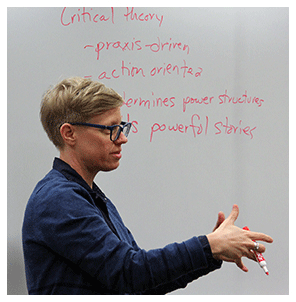 Emily Drabinski, a leading scholar in the area of critical information literacy, visited Purdue Libraries on March 3, 2016. Drabinski, Coordinator of Library Instruction and Associate Professor at the Brooklyn campus of Long Island University, received the Ilene F. Rockman Publication of the Year in 2015 for her article “Toward a Kairos of Library Instruction,” published in 2014 by The Journal of Academic Librarianship. She was also listed as a Library Journal Mover & Shaker in 2014. Emily Drabinski, a leading scholar in the area of critical information literacy, visited Purdue Libraries on March 3, 2016. Drabinski, Coordinator of Library Instruction and Associate Professor at the Brooklyn campus of Long Island University, received the Ilene F. Rockman Publication of the Year in 2015 for her article “Toward a Kairos of Library Instruction,” published in 2014 by The Journal of Academic Librarianship. She was also listed as a Library Journal Mover & Shaker in 2014.
At Purdue, she presented a talk titled, What Standards Do, and What They Don’t. In the presentation, Drabinski discussed her insights into the use of ACRL’s Information Literacy Competency Standards for Higher Educationand the move away from standards with the recent introduction of the new Framework for Information Literacy for Higher Education. She argues standards do not need to limit what we teach in our information literacy classrooms, but can still be useful tools for libraries to communicate with other higher education bodies, comply with institutional reporting requirements, and serve as platforms for resource claims at the institutional level. In the afternoon, Drabinski facilitated a workshop in which attendees considered the implications of using different critical theories, i.e., queer, antiracist and anticapitalist, to design information literacy instruction.
Drabinski followed up her time at the Libraries with a visit to Purdue’s Lesbian, Gay, Bisexual, Transgender, and Queer (LGBTQ) Center. Reported on in an Exponent article, Drabinski led a discussion with students at the Center about labeling queer identities. |
 |
IN MEMORY OF JIM BLAKESLEY
BY JIM MULLINS |
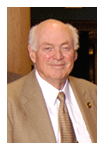 James F. (Jim) Blakesley was a true Boilermaker and a great friend of the Purdue University Libraries. He passed away Friday, March 4 at the age of 91. As the Director of Space Management and Academic Scheduling, he had an incredible responsibility to be certain that all classes had rooms that met their needs. He accomplished this feat for nearly 40 years. James F. (Jim) Blakesley was a true Boilermaker and a great friend of the Purdue University Libraries. He passed away Friday, March 4 at the age of 91. As the Director of Space Management and Academic Scheduling, he had an incredible responsibility to be certain that all classes had rooms that met their needs. He accomplished this feat for nearly 40 years.
After his retirement, as the president of the class of 1950, he spearheaded the funding and construction of the Class of 1950 building. He donated many collection materials to Archives and Special Collections relating to the history of buildings at Purdue, and was also on the advisory board for the oral history program.
Jim was an inaugural member in 1993 of what was to become the Dean's Advisory Council (DAC) of the Libraries. He remained on the DAC until 2005, when he assumed emeritus status. He and his wife, Rosemary, always contributed to lively discussions at DAC dinners.
I have two great memories of Jim. First, he had a handshake that I will always remember. After first shaking your hand, he would give it another squeeze. I always felt that it was his way of affirming his pleasure in seeing you again. Second, I overheard him say once, "the Old Power Plant will never come down, too many issues." Well, he lived to see that everything is possible. |
|
|
|



 Tamara E. Morse was honored on March 3 with the 2016 Outstanding Contribution to Women’s Archives Award at a reception celebrating the legacy of Purdue women and the preservation of Purdue history. Morse, whose stewardship ensures that the history of women at Purdue is recorded, preserved, documented and accessible for current and future generations was recognized for her commitment to the Women’s Archives.
Tamara E. Morse was honored on March 3 with the 2016 Outstanding Contribution to Women’s Archives Award at a reception celebrating the legacy of Purdue women and the preservation of Purdue history. Morse, whose stewardship ensures that the history of women at Purdue is recorded, preserved, documented and accessible for current and future generations was recognized for her commitment to the Women’s Archives.  Brett Crawford, assistant professor in the department of Technology Leadership & Innovation, was awarded $4,000 to travel to Montana State University to conduct archival research using The Trout and Salmonid Special Collection. The research aims to explore how environmental associations have contributed to the shifting identity of anglers, moving away from harvesters of trout and salmon populations and towards stewards of coldwater fisheries. Crawford plans to focus on photographs and unpublished manuscripts that detail early thought on river conservation and catch-and-release philosophies. The intended dissemination of the research is twofold. First, organizations and individuals commonly use images to portray human impacts on the natural environment. We know far less about what we would learn about the changing identities of people if we turned the camera around and tracked shifts in identity over time. This archive includes a large number of photographs that will deepen our understanding of early twentieth-century anglers’ identities and relationships with rivers. Second, Crawford has built out a large dataset detailing the emergence and expansion of environmental associations, such as Trout Unlimited, and special regulations intended to manage trout and salmon populations throughout U.S. coldwater fisheries. However, the archive at Montana State University includes a number of unpublished manuscripts written by the “fathers” of catch-and-release fishing that will further develop this research by capturing the origins of river conservation.
Brett Crawford, assistant professor in the department of Technology Leadership & Innovation, was awarded $4,000 to travel to Montana State University to conduct archival research using The Trout and Salmonid Special Collection. The research aims to explore how environmental associations have contributed to the shifting identity of anglers, moving away from harvesters of trout and salmon populations and towards stewards of coldwater fisheries. Crawford plans to focus on photographs and unpublished manuscripts that detail early thought on river conservation and catch-and-release philosophies. The intended dissemination of the research is twofold. First, organizations and individuals commonly use images to portray human impacts on the natural environment. We know far less about what we would learn about the changing identities of people if we turned the camera around and tracked shifts in identity over time. This archive includes a large number of photographs that will deepen our understanding of early twentieth-century anglers’ identities and relationships with rivers. Second, Crawford has built out a large dataset detailing the emergence and expansion of environmental associations, such as Trout Unlimited, and special regulations intended to manage trout and salmon populations throughout U.S. coldwater fisheries. However, the archive at Montana State University includes a number of unpublished manuscripts written by the “fathers” of catch-and-release fishing that will further develop this research by capturing the origins of river conservation. Marlo D. David, an associate professor in the department of English and the Women’s, Gender, and Sexuality Studies Program, was awarded $4,600 to conduct archival research in Los Angeles and New York City using several special research collections to begin work on a book manuscript, tentatively entitled Experimental Aesthetics: Recovering the Art and Life of Bill Gunn. Experimental Aesthetics involves developing a literary and artistic biography of African- American filmmaker, playwright, and actor Bill Gunn (1934-1989), who wrote and/or directed six films, wrote 11 plays, one novel, and performed as an actor throughout the influential U.S. Black Arts Movement (1965-1975). The Black Arts Movement (BAM) marked a major shift in 20th-century African-American literary and artistic production that grew out of the social and political aims of the Black Power Movement. Until recently, most of Gunn’s works had fallen into obscurity, and to date there is no full-length critical manuscript dedicated to his life or his films, plays, and novel. In Experimental Aesthetics, David seeks to recover the lost works of Gunn as well as produce a detailed biography of his life. In particular, she is interested in discovering how the explicit political aims of the BAM may have created tensions for an artist like Gunn, who operated outside of those ordained aesthetics. Gunn’s experimental work, especially his unflinching confrontation with sexuality and black identity, exemplify these tensions and therefore require further inquiry. David will use the Library Scholars Grant to take two, week-long exploratory trips to visit archives and collections in New York City and in Los Angeles in order to locate, read, and make copies of relevant materials related to Gunn’s work as a playwright and filmmaker, as well as to locate papers of his many friends and associates.
Marlo D. David, an associate professor in the department of English and the Women’s, Gender, and Sexuality Studies Program, was awarded $4,600 to conduct archival research in Los Angeles and New York City using several special research collections to begin work on a book manuscript, tentatively entitled Experimental Aesthetics: Recovering the Art and Life of Bill Gunn. Experimental Aesthetics involves developing a literary and artistic biography of African- American filmmaker, playwright, and actor Bill Gunn (1934-1989), who wrote and/or directed six films, wrote 11 plays, one novel, and performed as an actor throughout the influential U.S. Black Arts Movement (1965-1975). The Black Arts Movement (BAM) marked a major shift in 20th-century African-American literary and artistic production that grew out of the social and political aims of the Black Power Movement. Until recently, most of Gunn’s works had fallen into obscurity, and to date there is no full-length critical manuscript dedicated to his life or his films, plays, and novel. In Experimental Aesthetics, David seeks to recover the lost works of Gunn as well as produce a detailed biography of his life. In particular, she is interested in discovering how the explicit political aims of the BAM may have created tensions for an artist like Gunn, who operated outside of those ordained aesthetics. Gunn’s experimental work, especially his unflinching confrontation with sexuality and black identity, exemplify these tensions and therefore require further inquiry. David will use the Library Scholars Grant to take two, week-long exploratory trips to visit archives and collections in New York City and in Los Angeles in order to locate, read, and make copies of relevant materials related to Gunn’s work as a playwright and filmmaker, as well as to locate papers of his many friends and associates. Charlene Elsby, assistant professor of Philosophy at Indiana University-Purdue University, Fort Wayne (IPFW) was awarded $5,000 to travel to the Husserl Archives in Leuven, Belgium, to examine the original manuscripts of Edmund Husserl, and in particular those that provided the foundation for the text On the Phenomenology of Internal Time Consciousness (Phänomenologie des inneren Zeitbewußtseins). Elsby’s research will focus on the concept of time in early phenomenology — how it appears to consciousness, and how it is constituted by consciousness. An examination of the phenomenological concept of time follows naturally from her previous work on the concept of aesthetic genesis in phenomenology, which examines how a robust human consciousness arises from more basic perceptions. From this research, she will produce a monograph proposal, tentatively titled, The Origins of Time in Consciousness and Consciousness in Time. The Library Scholars Grant will allow for 3 weeks to examine the Husserl’s manuscripts and how they were edited by his assistants Edith Stein and Martin Heidegger. (Husserl’s published work on the concept of time has undergone significant modifications from the manuscripts, which are collected under the name of Zeitkonstitution als Formale Konstitution [Time Constitution as Formal Constitution] and housed in the central repository of the Archives in Leuven.)
Charlene Elsby, assistant professor of Philosophy at Indiana University-Purdue University, Fort Wayne (IPFW) was awarded $5,000 to travel to the Husserl Archives in Leuven, Belgium, to examine the original manuscripts of Edmund Husserl, and in particular those that provided the foundation for the text On the Phenomenology of Internal Time Consciousness (Phänomenologie des inneren Zeitbewußtseins). Elsby’s research will focus on the concept of time in early phenomenology — how it appears to consciousness, and how it is constituted by consciousness. An examination of the phenomenological concept of time follows naturally from her previous work on the concept of aesthetic genesis in phenomenology, which examines how a robust human consciousness arises from more basic perceptions. From this research, she will produce a monograph proposal, tentatively titled, The Origins of Time in Consciousness and Consciousness in Time. The Library Scholars Grant will allow for 3 weeks to examine the Husserl’s manuscripts and how they were edited by his assistants Edith Stein and Martin Heidegger. (Husserl’s published work on the concept of time has undergone significant modifications from the manuscripts, which are collected under the name of Zeitkonstitution als Formale Konstitution [Time Constitution as Formal Constitution] and housed in the central repository of the Archives in Leuven.) Rebekah Klein-Pejšová, an associate professor in the department of History, was awarded $5000 to conduct archival research in Hungary. Her current book project, with the working title “Across the Iron Curtain: Jewish Displacement, Dispersion, and Contact, 1945-1960,” examines the mutual efforts of Hungarian, Slovak, and Czech Jews remaining inside of postwar Hungary and Czechoslovakia and abroad to remain in contact with each other and the implications of their efforts for Jewish/state relations in the consolidating new global order. This study is organized around points of contact between Jewish survivors within their new postwar global dispersion. The relevant materials related to religion, national minorities and ethnic problems, refugees, and escapees crucial for completing her research for this project are uniquely held in collections of the Open Society Archives (OSA) in Budapest, Hungary. The OSA is one of the world’s largest repositories of Cold War, Radio Free Europe, and Samizdat holdings, especially known for its exclusive collections relating to the postwar political, social, and economic life of the Cold War era Eastern Bloc. The Library Scholars Grant will fund travel to Budapest for four weeks of research in the OSA collections on materials concerning contact between Hungarian, Slovak, and Czech Jews in postwar displacement and dispersion as individuals (family, friends), institutions, communal bodies, and international Jewish organizations across an increasingly fortified border. Klein-Pejšová first received a Library Scholars Grant in 2013, which allowed her to conduct archival research at the YIVO Institute for Jewish Research archives in New York City.
Rebekah Klein-Pejšová, an associate professor in the department of History, was awarded $5000 to conduct archival research in Hungary. Her current book project, with the working title “Across the Iron Curtain: Jewish Displacement, Dispersion, and Contact, 1945-1960,” examines the mutual efforts of Hungarian, Slovak, and Czech Jews remaining inside of postwar Hungary and Czechoslovakia and abroad to remain in contact with each other and the implications of their efforts for Jewish/state relations in the consolidating new global order. This study is organized around points of contact between Jewish survivors within their new postwar global dispersion. The relevant materials related to religion, national minorities and ethnic problems, refugees, and escapees crucial for completing her research for this project are uniquely held in collections of the Open Society Archives (OSA) in Budapest, Hungary. The OSA is one of the world’s largest repositories of Cold War, Radio Free Europe, and Samizdat holdings, especially known for its exclusive collections relating to the postwar political, social, and economic life of the Cold War era Eastern Bloc. The Library Scholars Grant will fund travel to Budapest for four weeks of research in the OSA collections on materials concerning contact between Hungarian, Slovak, and Czech Jews in postwar displacement and dispersion as individuals (family, friends), institutions, communal bodies, and international Jewish organizations across an increasingly fortified border. Klein-Pejšová first received a Library Scholars Grant in 2013, which allowed her to conduct archival research at the YIVO Institute for Jewish Research archives in New York City. Silvia Z. Mitchell, assistant professor of Early Modern European History, was awarded $ 5,000 to conduct archival research in Spain for an article-length project, titled “Anglo-Spanish Relations during the Regency of Queen Mariana of Austria, 1665-1675.” It focuses on the changing nature of Spain’s diplomatic relations with England under Queen Mariana’s leadership. The Spanish queen’s close collaboration with King Charles II, who returned to power in 1660 after his father’s, Charles I’s execution (1649), and the fall of the Cromwell regime, resulted in commercial and military alliances with pan-European and trans-Atlantic consequences. While marking an unprecedented level of close collaboration, justified by Spanish theologians as necessary for the good of Christendom, very little, if anything, has been published on this important topic. The Library Scholars Grant will help fund travel and six weeks of research in the Archivo Histórico Nacional in Madrid, the Archivo General de Simancas, in Valladolid, and the Archivo Nacional Sección Nobleza, in Toledo. Mitchell will study Mariana’s instructions to and correspondence with her diplomats in London. She will also consult the special series of Spain’s Council of State focused on Anglo-Spanish relations (Estado Inglaterra). In a previous Library Scholars Grant project (2014), Mitchell investigated Queen Mariana’s foreign policy from broad European perspectives.
Silvia Z. Mitchell, assistant professor of Early Modern European History, was awarded $ 5,000 to conduct archival research in Spain for an article-length project, titled “Anglo-Spanish Relations during the Regency of Queen Mariana of Austria, 1665-1675.” It focuses on the changing nature of Spain’s diplomatic relations with England under Queen Mariana’s leadership. The Spanish queen’s close collaboration with King Charles II, who returned to power in 1660 after his father’s, Charles I’s execution (1649), and the fall of the Cromwell regime, resulted in commercial and military alliances with pan-European and trans-Atlantic consequences. While marking an unprecedented level of close collaboration, justified by Spanish theologians as necessary for the good of Christendom, very little, if anything, has been published on this important topic. The Library Scholars Grant will help fund travel and six weeks of research in the Archivo Histórico Nacional in Madrid, the Archivo General de Simancas, in Valladolid, and the Archivo Nacional Sección Nobleza, in Toledo. Mitchell will study Mariana’s instructions to and correspondence with her diplomats in London. She will also consult the special series of Spain’s Council of State focused on Anglo-Spanish relations (Estado Inglaterra). In a previous Library Scholars Grant project (2014), Mitchell investigated Queen Mariana’s foreign policy from broad European perspectives.
 Emily Drabinski, a leading scholar in the area of critical information literacy, visited Purdue Libraries on March 3, 2016. Drabinski, Coordinator of Library Instruction and Associate Professor at the Brooklyn campus of Long Island University, received the Ilene F. Rockman Publication of the Year in 2015 for her article “Toward a Kairos of Library Instruction,” published in 2014 by The Journal of Academic Librarianship. She was also listed as a Library Journal Mover & Shaker in 2014.
Emily Drabinski, a leading scholar in the area of critical information literacy, visited Purdue Libraries on March 3, 2016. Drabinski, Coordinator of Library Instruction and Associate Professor at the Brooklyn campus of Long Island University, received the Ilene F. Rockman Publication of the Year in 2015 for her article “Toward a Kairos of Library Instruction,” published in 2014 by The Journal of Academic Librarianship. She was also listed as a Library Journal Mover & Shaker in 2014.  James F. (Jim) Blakesley was a true Boilermaker and a great friend of the Purdue University Libraries. He passed away Friday, March 4 at the age of 91. As the Director of Space Management and Academic Scheduling, he had an incredible responsibility to be certain that all classes had rooms that met their needs. He accomplished this feat for nearly 40 years.
James F. (Jim) Blakesley was a true Boilermaker and a great friend of the Purdue University Libraries. He passed away Friday, March 4 at the age of 91. As the Director of Space Management and Academic Scheduling, he had an incredible responsibility to be certain that all classes had rooms that met their needs. He accomplished this feat for nearly 40 years.



